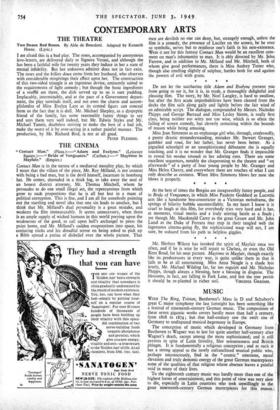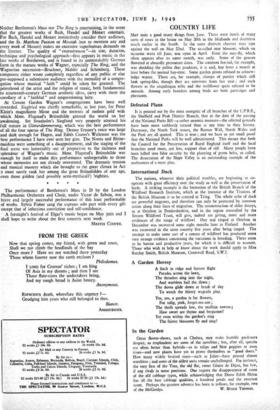MUSIC
WITH The Ring, Tristan, Beethoven's Mass in D and Schubert's great C major symphony the last fortnight has been something like a festival of nineteenth-century German music, The composition of these seven gigantic works covers hardly more than half a century, from 1818 to 1874; but that half-century saw the swift rise of Germany to undisputed musical hegemony in Europe.
The conception of music which developed in Germany from , Beethoven to Wagner was to last for quite another half-century after Wagner's death, except among the more sophisticated; and it still persists in spite of Latin frivolity, Slav sensuousness and British phlegm. It is fundamentally a religious conception ; and as such it has a strong appeal to the newly enfranchised musical public who, perhaps unconsciously, find in the " cosmic " emotions, moral elevation and truly demonic energy of the great German masterpieces some of the qualities of that religion whose absence leaves a painful void in many of their lives.
To the eighteenth century music was hardly more than one of the highest forms of entertainment, and this point of view was very slow to die, especially in Latin countries who took unwillingly to the great nineteenth-century German masterpieces for this reason. Neither Beethoven's Mass nor The Rmg is entertaining, in the sense that the greatest works of Bath, Handel and Mozart entertain. For Bach, Handel and Mozart instinctively consider their audience, and the St. Matthew Passion or Messiah (not to mention any and every work of Mozart) makes no excessive superhuman demands on the listener. The quality of "excessiveness "—in size, duration, technique and psychological approach—first appears in music in the late works of Beethoven, and is found in its unmistakably German form in the mature works of Wagner, especially The Ring, and the Wagnerian succession—Bruckner, Mahler and Schonberg. These composers either wrote completely regardless of any public or else pre-supposed a submissive audience with the mentality of a congre- gation whose musical " faith " could be taken for granted. The priesthood of the artist and the religion of music, both fundamental to nineteenth-century German aesthetic ideas, carry with them the corollary of a "faithful" and unquestioning laity.
At Covent Garden Wagner's congregations have been well rewarded. Siegfried was chiefly remarkable, as last year, for Peter Klein's magnificent Mime and the torrents of molten gold with which Mme. Flagstad's Briinnhilde greeted the world on her awakening. Set Svanholm's Siegfried very properly attained his full stature in Gorterdiimmerung, which was the best performance of all the four operas of The Ring. Dezsoe Ernster's voice was large and dark enough for Hagen, and Edith Coates's Waltraute was the best performance I have ever seen her give. The Noms and Rhine- maidens were something of a disappointment, and the staging of the final scene was lamentably out of proportion to the richness and splendour of Wagner's music. Mme. Flagstad's Briinnhilde was enough by itself to make this performance unforgettable to those whose memories are not already overstored. The dramatic tension and musical mastery which she brought to the great climax in Act 2 must surely rank her among the great Briinnhikles of any age, even those golden (and possibly semi-mythical?) 'eighties.
The performance of Beethoven's Mass in D by the London Philharmonic Orchestra and Choir, under Victor de Sabata, was a brave and largely successful performance of this least performable of works. Sylvia Fisher sang the soprano solo part with every gift except that of infectious conviction and self-confidence.
A fortnight's festival of Elgar's music began on May 30th and I shall hope to write about the first concerts next week.
MARTIN COOPER.



































 Previous page
Previous page